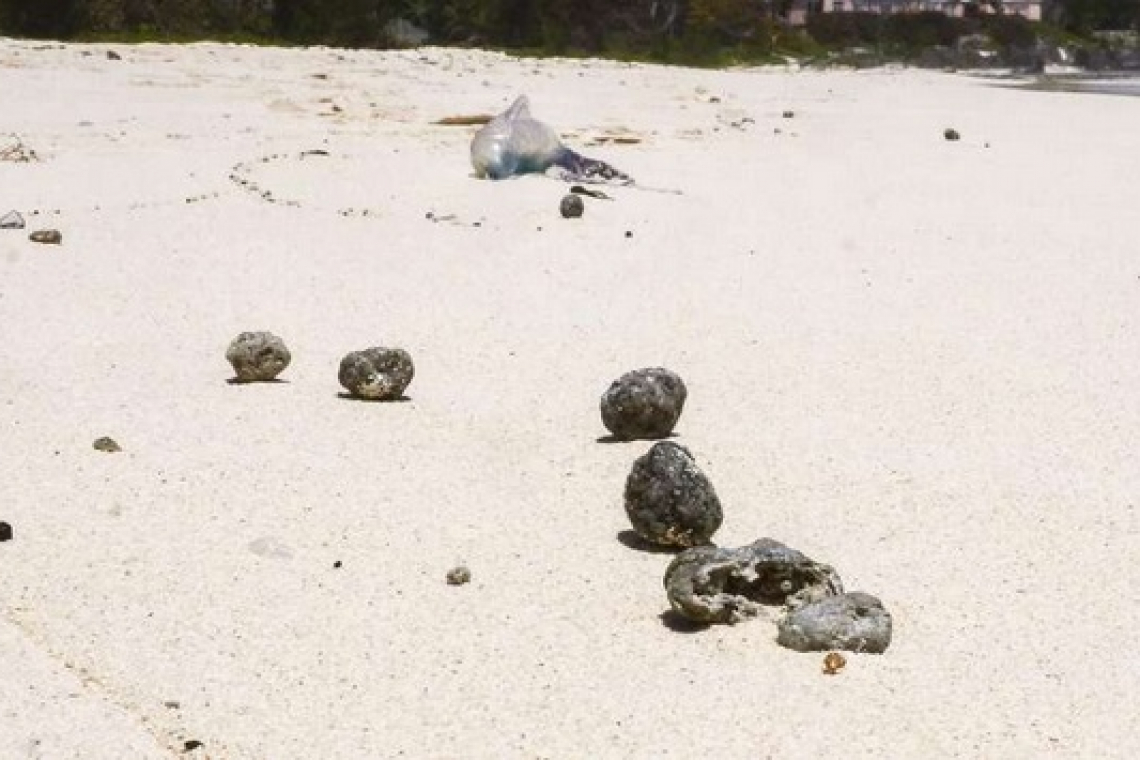Beach sewage: greaseballs washed up at Grape Bay in 2014.
HAMILTON, Bermuda--The City of Hamilton has promised to invest in major upgrades to its wastewater system to keep waste out of the ocean and further prevent “greaseballs” on South Shore.
City Engineer Patrick Cooper said the municipality will purchase and install two fine-mesh screening machines at the Front Street Wastewater Treatment Plant, which would remove about 40 per cent of suspended solid waste from the wastewater.
“Once we get these new screens installed, they will prevent 1,210 litres of solids per day from going into the outfall – this is essentially a large dumpster of solids a day,” he said.
Cooper explained that the city and surrounding area had used a community sewage system for more than 100 years that released waste into the ocean off South Shore.
“Over that period of time, several upgrades have been made to improve the system,” he said. “Most recently, in 2015 the city carried out a refurbishment of the existing wastewater filtering screens from 6mm to 3mm perforated plates, preventing any solids more than 3mm in size from being discharged from the outfall.
“This was partly in response to the infrequent but unpleasant appearance of ‘greaseballs’ washing ashore on beaches near the outfall during that time, caused by rare and short-lived seasonal conditions such as abnormal winds and currents. The two new screens we will install are even more restrictive against solids, preventing anything over 0.35mm from passing through them – there will be no bits or lumps, just liquid, which will further decrease the incidence of greaseballs forming along South Shore.”
An object that is 0.35mm is equivalent to the thickness of three sheets of paper or a fingernail.
A City of Hamilton spokeswoman added that the upgraded filtration system would also significantly reduce the amount of macro and micro plastics released into the ocean at the outfall. She said: “These plastics can enter the sewer system through incorrect disposal of plastic materials, through the use of personal care products containing microbeads, and through the laundering of clothing containing plastic fibres, such as polyester.
“The city will also commence a peracetic acid (PAA) disinfection process on the wastewater prior to it being expelled through the Seabright outfall. This will significantly reduce the levels of bacteria in the effluent, thus further safeguarding the quality of our bathing water which is already within regulatory standards.”
The spokeswoman said PAA has been used at wastewater facilities in coastal areas of Europe to protect water quality without causing harm to aquatic life.
She said the city implemented a fats, oils and grease (FOG) policy in 2014 to require commercial good establishments to properly dispose of their FOG and install grease traps which are regularly checked by government and city officials. The Government of Bermuda then implemented related health regulations in 2017 based on the city’s policy.
Cooper said the FOG policy had led to a major improvement in the amount of grease reaching the Front Street Wastewater Treatment Plant.
“Prior to implementing the FOG policy, we were removing grease from the plant four times a week,” he said. “Now, we only have to remove grease once every two weeks. The city collects approximately 5 tons – or 10,000 gallons – of waste cooking oil per week.” ~ The Royal Gazette ~







